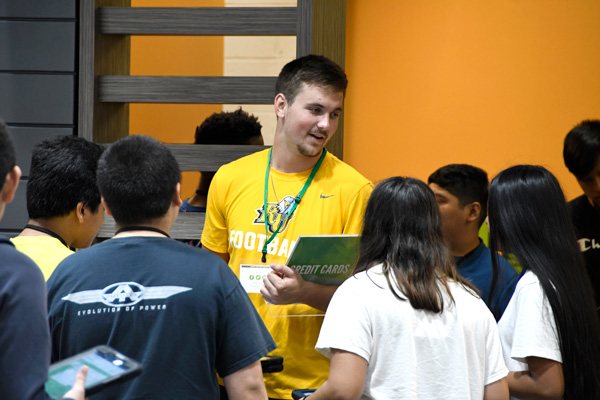By Jordan Beach
By the end of Fall 2019, Reinhardt first-year students will complete over 3,500 hours of volunteer service.
Before the school year officially began, Eagle Bound offered first-year students the chance to give back to the community and worldwide with PaintFest, where students painted colorful canvases to brighten hospital rooms for the Foundation for Hospital Art, and Rise Against Hunger, where students and volunteers packed 20,000 meals for those in needs of nutrient-rich food.

Students enrolled in First Year Seminar (FYS), a course that prepares Eagles for success during their four years at Reinhardt, are taking their efforts to Forsyth County at the Junior Achievement Discovery Center, a facility that simulates real-life scenarios for children to learn about business and finances. The time is spent helping students navigate BizTown and FinancePark, the interactive educational experiences that promote financial literacy.
“Financial Literacy is a significant challenge for college-age students, and that is a primary focus of Junior Achievement,” said Dr. Walter May, dean of students. “The curriculum offered through Junior Achievement focuses on high impact and engagement in learning for both the participants and volunteers.”
May believes it’s beneficial for undergraduate students to be challenged to apply a concept they are learning by teaching middle and high school students who do not necessarily have the same level of knowledge or appreciation of the topic.
“Ultimately, the purpose of the service‐learning experience is to give students the opportunity to apply course concepts in a real-world setting and provide needed services while collaborating with a community partner,” said May.
Destiney Carroll, biology major, found the importance of community service in her FYS course through the visible impact made on others’ lives.
“I think it’s important because you can see how many people you are reaching and just getting to see how happy they are to see people volunteer to help them.”
Musical theatre major Judah Norman also felt the tangible difference she was making as she guided her students around the BizTown simulation, sharing valuable discussions about applying the concepts they were learning to the real world and encouraging them throughout the day by offering insight on their business strategies.
“Being an active participant in the community provides the opportunity for people to witness and pay attention to the world around them rather than staying in the human default setting of only focusing on themselves. Volunteering can also be a give-and-take cycle of emotional fortitude and a stimulant for one’s well-being because it allows individuals to make a positive impact on others and vice versa,” said Norman. “Just as I aided the middle school students, I also was affected by their warm energy.”
“It was really amazing to see all the kids learning about the real functions of the business and seeing if their strategies were successful or not,” Carroll said.
Norman’s experience affected her on a personal level as she observed their resourcefulness and tenacity while problem-solving.
“As a more introverted individual, it can at times be quite frightening to interact and communicate with other students,” said Norman. “Watching the students fearlessly jump right in and get involved with each other inspired me to try that same principle in my own life and it is becoming steadily easier to come out of my shell socially and be an even more active participant in my classes and college as a whole.”
Her time volunteering took Norman back to her fourth-grade experience with Junior Achievement in Charlotte, North Carolina, and she found it exciting to see how advanced the stores and companies looked and functioned compared to when she was younger.
“I volunteered at JA BizTown’s Northside Hospital and working with the middle school students who came that day was thoroughly enjoyable, insightful, empowering and especially nostalgic,” said Norman.
The college experience is full of personal growth and connections; however, the First Year Seminar curriculum enables students to find ways to change the lives of the people around them. Some service-learning objectives for the newly updated FYS curriculum includes increasing students’ understanding of personal finance concepts, develop critical thinking skills with respect to financial planning concepts, applying knowledge gained to their personal financial situation and becoming financially responsible adults who save regularly and use credit wisely.

